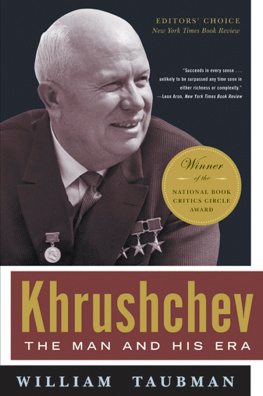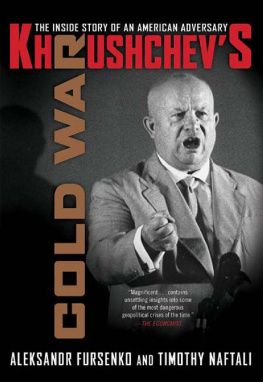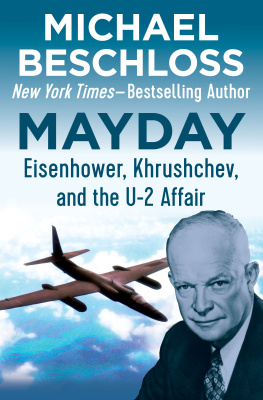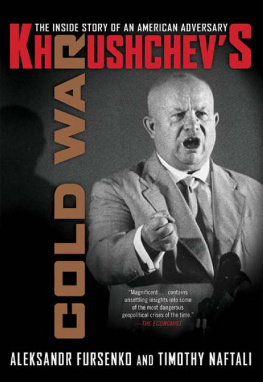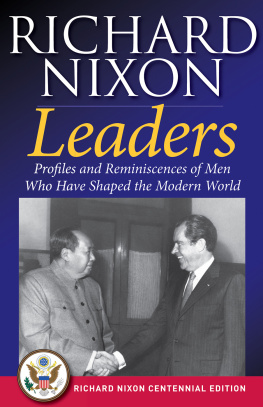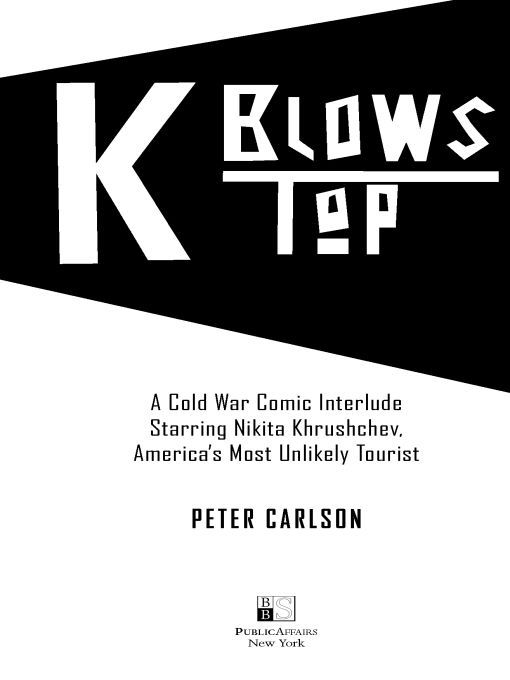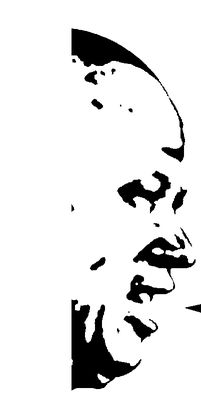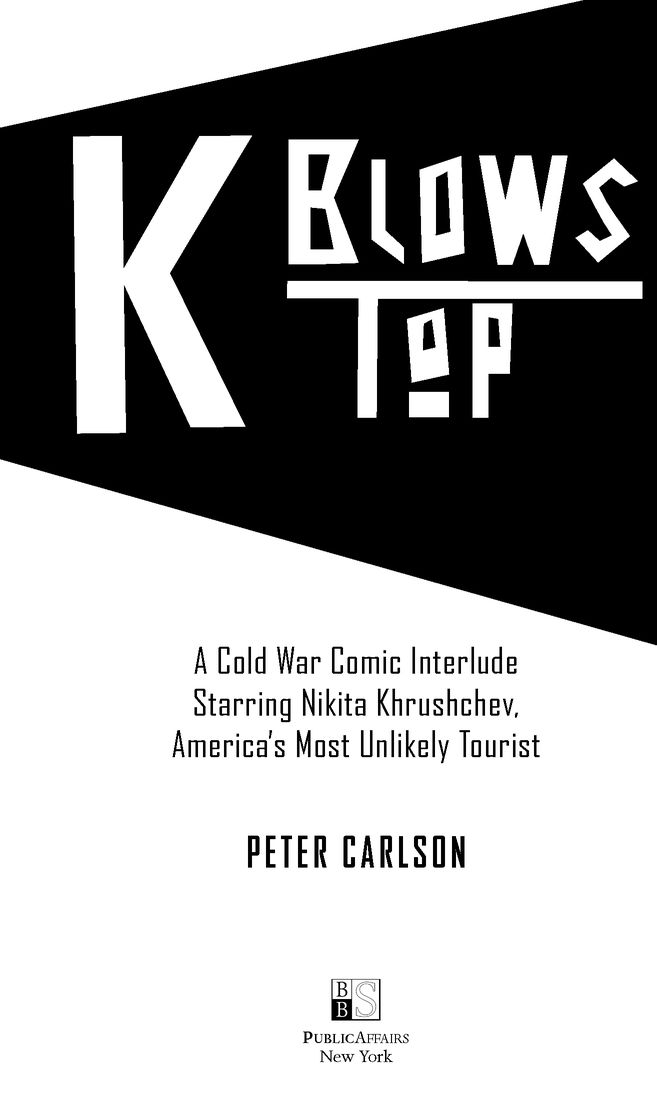Table of Contents
For my daughters, Emily and Caitlin,
and of course, once again, for Kathy
PROLOGUE: K BLOWS TOP
Maybe it was Khrushchev throwing a temper tantrum because he wasnt allowed to visit Disneyland.
Or maybe it was Khrushchev debating Nixon about which animal dung smells worst. Or maybe it was Khrushchevs fear that Camp David was really a leper colony. Or maybe it was the American Dental Associations courageous battle to defend the Waldorf-Astoria ballroom from Khrushchevs invasion. Or maybe it was Khrushchevs historic meeting with Marilyn Monroe, who later described the magic moment in her inimitable sexy purr. Khrushchev looked at me, she said, the way a man looks on a woman.
Im not sure which of these delicious anecdotes turned me into the worlds most zealous (and perhaps only) Khrushchev-in-America buff, but Im certain that it happened on a Thursday or a Friday.
This was back in the mid-1980s, when I was a rewrite man at People magazine, a job that compelled me to type furiously on Mondays, Tuesdays, and Wednesdays but required almost no work on Thursdays and Fridays. To fill the idle hours, I amused myself by exploring the treasures of the Time-Life library of newspaper clippings. Id remember some famous person whod lived since the founding of Time magazine in 1923, then call the library and request the clippings on him. A few minutes later, a messenger would drop a folder on my desk. I perused the clips on such great American characters as John Dillinger, Emma Goldman, and Father Divine. It was fun.
One day, after reading somewhere that Soviet Premier Nikita Khrushchev had been barred from Disneyland during his tour of America in 1959, I called the library and requested the clips on his trip. A few minutes later, a librarian called back. There are an awful lot of them, she said. Are you sure you want them all?
I replied with the phrase thats launched a million misadventures: Sure, why not?
Soon a messenger appeared, pushing a cart packed with bulging folders. Lined up against my office wall, they covered more than ten feet of floor space. I turned the first one upside down on my desk and quickly found myself falling through a rabbit hole into a weird wonderland. At first I just glanced at the headlines:
KHRUSHCHEV IS A SHOWMAN ON HIS ARRIVAL
KHRUSHCHEVS WHISKEY JOKE
KHRUSHCHEVS U.S. TOUR
LIKE TRAVELING CIRCUS
And this one, which, for some reason, still makes me laugh:
KHRUSHCHEV
TO GET FREE
DRY CLEANING
Actually, most of the headlines did not contain the word Khrushchev. His name was frequently too long to fit, so the unsung poets who create Americas headlines had to conjure up shorter monikers. They nicknamed the visitor Khrush (Khrush Irked in Hollywood) or Khrushy (Be Warned! Khrushy Is a Clever TV Performer) or Niki (Question Sizzles Niki). Frequently the headline writers referred to the chairman of the Council of Ministers of the Union of Soviet Socialist Republics simply as K, as if he were a character out of Kafka:
K TAKES FIFTH
BEFORE SENATORS
MR. K ROARS WITH LAUGHTER
DOES MRS. K WEAR THE PANTS?
SEES K ON
TV, SO HE
MURDERS 2
And the classic
New York Daily News headline that inspired the title of this book:
DENIED TOUR
OF DISNEYLAND,
K BLOWS TOP
Illustrating the adventures of K in America were photos of the pudgy traveler, who mugged shamelessly for the cameras like a mischievous eight-year-old. Khrushchev may have been a dictator responsible for thousands of deaths, but he was also an incurable ham who couldnt bear to disappoint a photographer. Consequently the pictures in the clip folders were wonderfully wacky: Khrushchev grabs a live turkey! Khrushchev pats a fat guys belly! Khrushchev gawks at chorus girls! Khrushchev pretends to shoplift a napkin holder by stuffing it into his suit jacket while laughing uproariously!
Khrushchevs trip was, as cold war historian John Lewis Gaddis dubbed it, a surreal extravaganza. Within an hour of reading the first clipping, I was hooked. For months, I spent my Thursdays and Fridays following the adventures of K as he traveled from Washington to New York to Hollywood to San Francisco to Iowa to Pittsburgh to Camp David, creating hilarious havoc all the way.
The trip was a picaresque journey across America, like Huckleberry Finn, On the Road, or National Lampoons Vacation. The worlds leading Communist traipsed through capitalist America at the height of the 1950sa land of movie stars, rock and roll, tail fins, suburbs, segregation, missile silos, fallout shelters, and duck and cover drills. He was a not-so-innocent abroad in a landscape populated by posturing pols, hustling PR men, angry protesters, gate-crashers, anti-Communist skywriters, and mobs of frenetic reportersplus Frank Sinatra, Shirley MacLaine, J. Edgar Hoover, Perle Mesta, Richard Nixon, JFK, LBJ, and a crotchety Iowa corn farmer named Roswell Garst, the only man on earth who could steal a scene from Nikita Khrushchev.
The trip was hilarious but the humor was darkened by the shadow of the atomic bomb, which rendered the cold war the first era in history when rational humans feared an apocalypse that could end civilization. As Khrushchev kept reminding peopleby his comic tantrums and his grisly jokeshe was a hot-tempered man who possessed the power to incinerate America.
In time, those folders of yellowed newspaper clippings led me to the memoirs of the people whod participated in Khrushchevs grand tour: Nixon, Eisenhower, MacLaine, Henry Cabot Lodge, William Safire, Bob Hope and, of course, Khrushchev himself, whose autobiography, secretly dictated and smuggled to the West after his ouster, was as earthy, outrageous, and full of blarney as its author.
The memoirs steered me back two months to Nixons trip to Moscowwhere he jousted with Khrushchev in the now legendary kitchen debateand then forward to 1960, when Khrushchev returned to New York for an encore visit now best remembered for the moment when he took off his shoe and banged it on a desk at the United Nations. Soon the story of one trip had expanded into the story of three trips, each one more bizarre than the previous. My boredom-born whim had grown into an eccentric obsession. Fortunately, I kept encountering evidence that other people had shared my delight in this bizarre tale.
In nearly 40 years of journalism, the Khrushchev visit to America was undoubtedly the most fascinating story that I covered, wrote Chalmers Roberts, who chronicled K for the Washington Post, which devoted more space to the story than to any that preceded it. It had everything: a fabulous personality, conflict, human interest, the unexpected. It was an embarrassment of riches.
The wildest comic scenes in my life in this comic country have always belonged to Nikita Khrushchev, wrote columnist Murray Kempton. It is odd that not one of my fellow voyagers has thought to do a book; it has to have been the most profoundly entertaining public experience of our lives. Perhaps no one believes it.
Well, I believed it and



